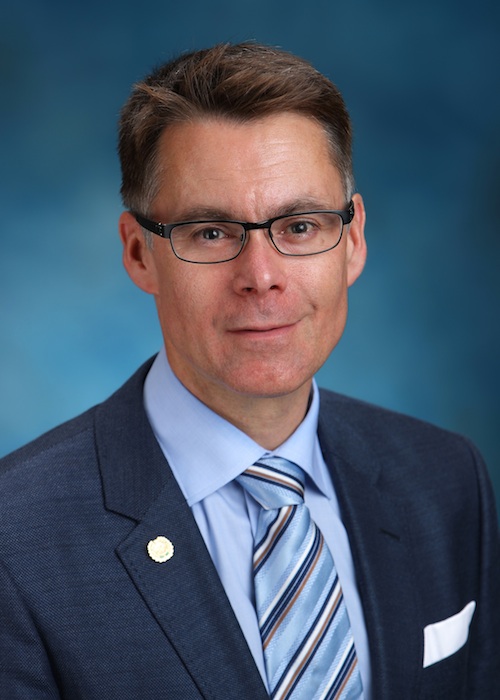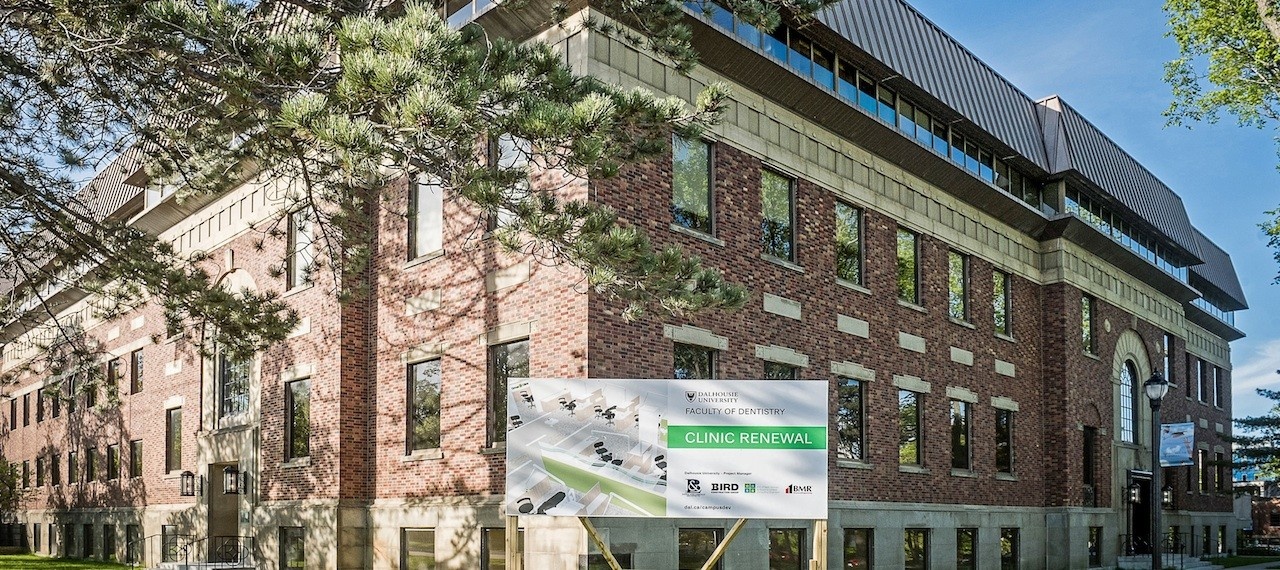News
» Go to news mainFive questions with Dr. Ben Davis

Oral and maxillofacial surgeon Dr. Ben Davis was appointed dean of the Faculty of Dentistry after serving six months in an acting role. He took up his five-year contract on January 1, 2018. Here, he answers five questions about his plans and hopes for the Faculty for the five years that lie ahead.
Q: Congratulations on being appointed dean of the Faculty of Dentistry. What does your new role mean to you and is there anything in your training and work as an oral maxillofacial surgeon that helped prepare you for this role?
A: I’m extremely proud to be named the Faculty’s 13th dean. I really see this is an opportunity to have a positive impact on the Faculty. The six months in the interim role made me appreciate just how much of an influence a dean has on the present state and future direction of a Faculty. I’m really encouraged by the positive feedback I’ve had since the announcement was made and I’m very excited to take on this role. I’m also very grateful for the tremendous assistance I’ve received from the senior leaders among our staff and faculty.
My training and career as an oral and maxillofacial surgeon have helped prepare me for this new role, particularly in the sense that my specialty is the oral health profession that works most closely with other health professions. From day one of your training, you are in a hospital environment where, as a dentist, you have to interact and work together with numerous other health professions. As a result, you learn very early on how to work collaboratively with other health care providers, be they occupational therapists, physiotherapists, dieticians, nurses, or physicians. This has certainly helped me appreciate and work comfortably with my colleagues from other health-related disciplines and faculties as we collaborate to manage the needs of our patients. We also have strong connections with many other faculties, including those outside the obvious health-related ones. Fortunately, our dental students receive much more inter-professional education today than I did as a student, so they are now coming out better prepared in this regard.
As a district chief at the QE II Health Sciences Centre, I was introduced to the co-leadership model of administration, which means that a number of senior administrators share the responsibility for leading a unit. I believe this organizational structure works well in our Faculty where we have such a wealth of capable senior administrators.
One of the other abilities my training and career helped me develop is time management and multi-tasking. I’ve learned not to procrastinate, because you’re likely going to have more asked of you tomorrow. Try to get things done well, but in a timely manner. As for multi-tasking, I am continuing to work in my field and serve as dean. I’ve spoken with the other deans in the health professions and they share my view that it is imperative to stay actively involved in clinical care. It’s hard to appreciate what your students are going through, and for you to stay at the forefront of your profession, if you’re not actively involved in some facet of clinical care. I’ve had to dial back the amount of clinical care I undertake, but I’m still teaching the residents and students at the hospital.
Q: You spent six months as acting dean. During this time, what surprised or delighted you most about the role of dean that you didn’t know before?
A: Any person in a senior role would benefit from being in an acting role for a short period of time. There are facets to being a dean that you simply don’t fully grasp or appreciate as a faculty member. My time as acting dean made me appreciate just how much has to be done and accomplished by the office of the dean – not necessarily the position itself, but all the people supporting the office.
I already knew some of the leaders at the Faculty level, but I didn’t know the university senior administrators. I have discovered that they are as passionate about the university and the students as we are. I enjoy connecting with the other deans, the provost, the AVPs and now see them in a whole new light. They have difficult jobs and I have a newfound appreciation for what they do. Our Faculty senior administrators – whether it’s the director of the School of Dental Hygiene, the assistant deans, or the chairs of the three departments – are incredible at what they do and supportive of what this office does. I sometimes think that the dean is the least important of all those positions! I feel like the conductor of the symphony, but I guess that’s the nature of leadership. I’m really impressed by how critical these senior administrative roles are within the Faculty and how well they are being done by the present leaders.
I’m also thankful to be able to interact with the students much more now that I am dean. They’re a wonderful group of young women and men and we’re incredibly lucky to have them as students.
The future of dentistry: a blend of prevention and sophisticated technology
Q: The dentistry profession, like any medical health-related field, is continually changing and adapting to new technology and techniques. What emerging developments or trends do you think today’s students need to be prepared for? What is Dal doing to help prepare them?
A: It’s an increasingly challenging time because the debt-load that students are carrying is already very large and growing. Yet, at the same time, there is a real need to have our graduates provide care to marginalized and underserved populations. A significant percentage of Nova Scotian adults don’t have regular access to oral health care and 30% of elective OR time at the IWK is used to treat childhood caries and the effects of childhood caries. There’s a tremendous need for prevention and the provision of primary care. That means focusing more on core care – preventing caries, periodontal disease, and oral disease in the first place. Providing outreach to marginalized populations is, and will continue to be, incredibly important.
We’re also moving at a very fast rate in terms of technological change. There are new biomaterials being developed all the time and bio-engineering will be able to replace hard and soft tissue of the oral cavity. We’ll be looking at the transition of this technology from bench top to clinical chair in our lifetime. In medicine, we are talking about patient-specific care and individualized care and I think we’re doing a lot of that in dentistry already. Increasingly we’re going to be seeing more individualized care in terms of drug therapy and patient-specific prostheses for reconstructing parts of the craniomaxillofacial region. These new treatments are typically more expensive. We need to figure out how we can afford these new developing technologies and treatments. One potential way is to improve preventative care and decrease the overall disease burden of the population.
I believe dental hygiene will have a huge role to play on the preventative front. I’m really pleased to see the evolution of their scope of practice and their growing independence from dentists. I think we will see dental hygienists have even more autonomy, similar to nurse practitioners, and take on much of the preventative oral care, particularly in communities without full-time dentists.
Q: What do you hope to achieve during your first term – an achievement for which you would like to be remembered?
A: Let’s start with several of the things I really want to achieve and then focus on what I’d be most proud of. Clinic renewal is number one. We are in the process of completing this brand new, state of the art clinic. It is world class and I thank Dr. Tom Boran for his foresight and passion in championing this huge undertaking. There are still a few small parts of the project to complete. We also promised the university that we would raise $6 million dollars of the over $28 million total cost of the project. We need to raise about $1 million and I really want to wrap up this fundraising project by the time of our official clinic opening and naming ceremony on September 28, 2018. It would be a great way to celebrate Homecoming and Dal’s 200th anniversary.
We are also talking about curriculum renewal and the group practice model is part of that. I had a wonderful conversation recently about the Centre for Collaborative Clinical Learning and Research (C3LR). There are so many opportunities for collaboration and simulation using the facilities available in the CHEB. We have a great sim lab here in the Dentistry Building for clinical care, but the CHEB offers simulation for teaching our students communication skills. For example, how to have difficult conversations with patients, such as about complications. Other topics could include ethics, professionalism, how to deal with autistic patients – these are all areas where simulated learning could help students develop the necessary skill sets. I would like to see us integrate the simulation lab in the C3LR more fully into our students’ curriculum.
I think we need to look at our curriculum to see where there is duplication or repetition and find ways to free up some time for these very exciting educational opportunities. I think there are pedagogical tools that we are not currently using that some of our healthcare colleagues have available and that we should be trying to use.
I also want to support and have a bigger emphasis placed on research in this Faculty. What I would probably be most proud of is attracting a research chair in dentistry. We’ve never had one. Whether it’s an endowed chair or an industrial research chair – this will be a focus for me.
On top of all of that, I really want everyone to be proud to work here, to be respectful of their colleagues, the institution, and the students.
So those are some of the things I really want to work on over the next five years. I think we’re making progress on some of them already.
Q: What might the people in the Faculty of Dentistry be surprised to know about you?
A: Well, they already know that I’m a keen cyclist, so I won’t say that. I’m a bit of a crazy pet owner with two cats and two dogs. My dad was born in St. Kitts, a small island in the West Indies, and I still have many relatives who live there. My maternal grandfather was a Nova Scotian and received his law degree from right here at Dal!
Recent News
- DentDays 2024: A time to reconnect and celebrate
- 2024 Academic Awards Celebration: "We did it together"
- Dr. Frank Lovely and his network of influence
- New mural celebrates partnership and better health for all
- Meet Krysti Campbell: 2024 OAA recipient
- Meet Dr. Linda Blakey: 2024 OAA recipient
- A taste for history
- How I spent my summer: Seeing the light in the lab
